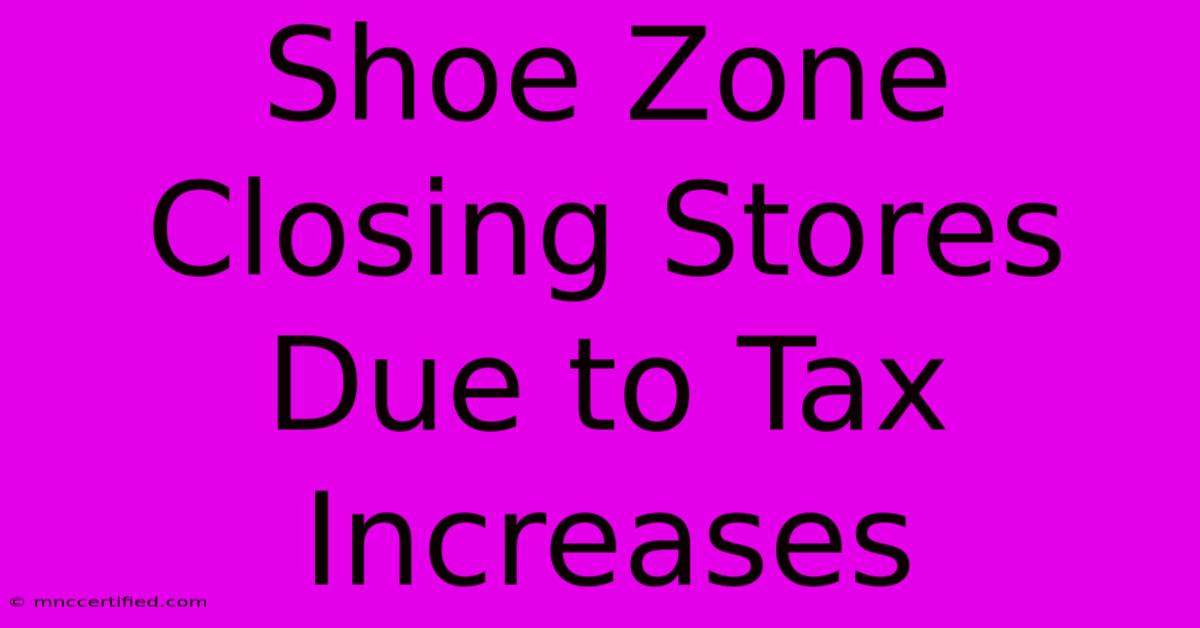Shoe Zone Closing Stores Due To Tax Increases

Table of Contents
Shoe Zone Closing Stores Due to Tax Increases: A Deep Dive into the Retail Crisis
The UK's budget shoe retailer, Shoe Zone, has announced plans to close several stores, citing increased business rates as a major contributing factor. This decision highlights a broader struggle faced by many high street retailers grappling with rising costs and economic uncertainty. This article delves into the reasons behind Shoe Zone's store closures, the impact on employees and consumers, and the wider implications for the UK retail landscape.
Rising Business Rates: The Primary Culprit
Shoe Zone, like many other retailers, is facing the brunt of escalating business rates. These property taxes, based on the rateable value of a property, have increased significantly in recent years, placing a considerable strain on businesses' profitability. For a retailer with a large physical presence like Shoe Zone, these increases represent a substantial financial burden, directly impacting their bottom line. The company has stated that these rising rates are unsustainable and have forced them to take drastic measures, including store closures, to remain viable.
The Impact on High Street Retailers
Shoe Zone's predicament is not an isolated incident. Many high street retailers are facing similar challenges, leading to a wave of store closures across the UK. This trend is exacerbated by other factors such as increased inflation, rising energy costs, and the continued shift towards online shopping. The cumulative effect of these pressures is creating a perfect storm for businesses struggling to maintain profitability. The government's response to these issues, and potential future tax reforms, are under close scrutiny.
Beyond Business Rates: A Multi-Faceted Challenge
While business rates are a significant factor in Shoe Zone's decision, it's crucial to understand that it's not the sole cause. Other contributing factors include:
- Increased operational costs: Inflation is impacting the cost of goods, wages, and other operational expenses, squeezing profit margins.
- Shifting consumer behavior: The rise of online shopping continues to pose a threat to traditional brick-and-mortar retailers, impacting footfall and sales.
- Supply chain disruptions: Ongoing global supply chain issues have added to the complexity of sourcing and distributing products, increasing costs and impacting stock availability.
The Human Cost: Job Losses and Community Impact
The closure of Shoe Zone stores inevitably leads to job losses, impacting employees and their families. These closures also have a knock-on effect on local communities, potentially reducing footfall and impacting other businesses in the vicinity. The loss of a well-established retailer can significantly alter the character of a high street, especially in smaller towns and cities.
What's Next for Shoe Zone?
Shoe Zone's future remains uncertain. While the company is taking steps to restructure its business, including store closures, the long-term sustainability of the business model remains a question. The company will need to adapt to the changing retail landscape, finding ways to compete effectively in an increasingly challenging market. This might include a greater focus on online sales, exploring new retail formats, and advocating for more favorable business rate policies.
Conclusion: A Wake-Up Call for the Retail Sector
Shoe Zone's store closures serve as a stark reminder of the challenges facing the UK retail sector. The escalating costs, particularly business rates, are putting immense pressure on businesses, leading to job losses and impacting high streets across the country. Addressing these issues requires a collaborative effort between the government, retailers, and other stakeholders to find sustainable solutions that ensure the long-term viability of the UK's retail landscape. The debate surrounding fair taxation for businesses and the support needed for high street regeneration remains a critical one. Only through proactive measures can we hope to mitigate the ongoing crisis and safeguard the future of retail in the UK.
Keywords: Shoe Zone, store closures, business rates, high street retail, UK retail, economic uncertainty, inflation, job losses, online shopping, supply chain disruptions, tax increases, retail crisis, property taxes, government policy.

Thank you for visiting our website wich cover about Shoe Zone Closing Stores Due To Tax Increases. We hope the information provided has been useful to you. Feel free to contact us if you have any questions or need further assistance. See you next time and dont miss to bookmark.
Featured Posts
-
House Ethics Committee On Gaetz Case
Dec 19, 2024
-
December Lfc Women Player Vote Now
Dec 19, 2024
-
My Lfc 500 Lfc Retail Giveaway
Dec 19, 2024
-
Relationship Rumors Cardinals Player Responds
Dec 19, 2024
-
3 2 Victory Arsenal Vs Crystal Palace
Dec 19, 2024